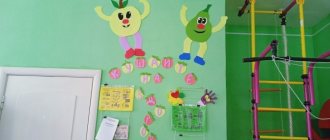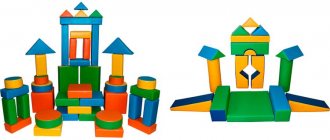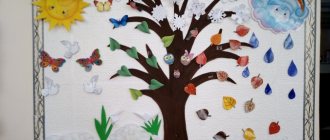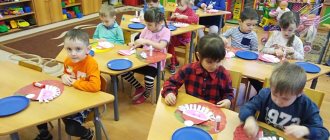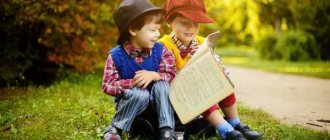Observation calendars
The most common Nature calendar contains arrows or signs to display the weather, day of the week, season, date - depending on age.
I offer you a simplified version that will decorate any center (right-click on the picture and select save picture as to download it to yourself).
Calendar, nature, weather, observations
More templates for creating a nature calendar are available in the VIP section. The section is available after registration using a password
You can add days of the week to the calendar. For example, in the form of a circle with a rotating top part. Leave the desired day of the week in the slot.
days of the week
Options with clothespins are interesting; they are suitable for middle age.
The observation calendar can become more complex. For example, in older groups, children find and color in the days of the week, use icons to indicate weather phenomena, and depict a tree and the cover of the earth in full accordance with their seasonal state at the moment. They supplement the calendar with their own sketches, for example, “What wonderful autumn (winter/spring/summer weather) it was today.”
The bird watching calendar is a narrower, but also important component of the center. Kids find pictures depicting birds that they saw on the site, and older children designate them with icons - checkmarks of the corresponding color.
Bird watching calendar
Plant growth calendars are pictures that show the sequential growth of a plant. It can be:
- flowers transplanted from a flower bed, a bulb in a jar planted in water for germinating greens;
- tree branches placed in a vase at the end of winter to observe the budding and development of young leaves;
-germination of seeds, growth and development of any garden or flower crop.
In all cases, the drawings, made at the same time interval, reflect the sequence of growth and development of the plant, its dependence on external living conditions.
What is the significance of a corner of nature?
Cognitive development: children’s knowledge about nature expands, interest arises in its knowledge, the desire to learn new things, curiosity, logical thinking, attention, and observation develop.
Aesthetic significance: a vision of the beauty of nature is formed, creative imagination develops.
Educational value: moral qualities and an emotionally positive attitude towards nature are formed (caring attitude, care for living beings, respect for work, feelings of patriotism, love for nature).
Practical significance: acquiring labor skills to care for the inhabitants of a corner of nature and such qualities as hard work, responsibility for the assigned work, initiative. Already from the younger group, children are involved in carrying out individual work assignments. And from the senior group on duty at the nature center is introduced.
Health value: plants improve the microclimate of the room, humidify the air, purify and enrich it with oxygen, medicinal plants are used for medicinal purposes.
Temporary inhabitants of the nature center
Temporary inhabitants of a nature center are objects that are brought in for observation for a short period of time
| Autumn | Winter | Spring | Summer |
| Bouquets of autumn flowers in vases. Flowering plants of the flower garden (asters, chrysanthemums, marigolds). Crafts for children made from natural materials (older age). | Boxes with plantings (onions, oats, beans, etc.) Branches of trees and bushes in vases. Ekibans, children's crafts. | Branches of trees and shrubs in vases. Boxes with seedlings. Bouquets of colorful plants (willow, flowers). | Bouquets of flowers in vases |
